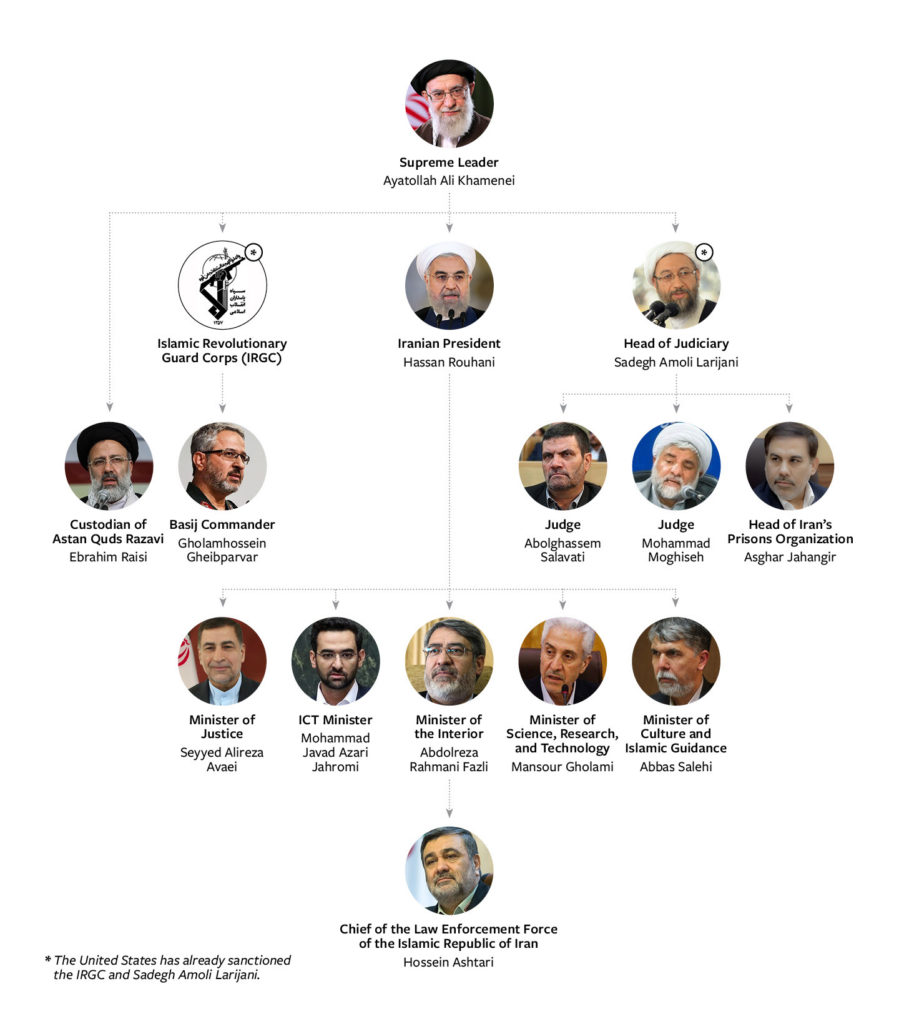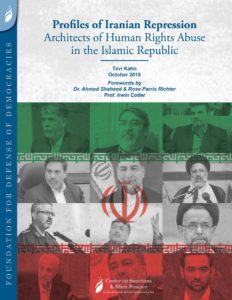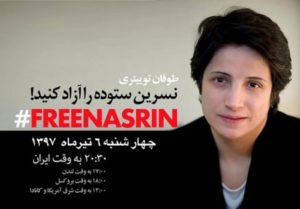
Credit: FDD
Iran has sentenced two human rights lawyers to six years in prison and a third to 13 years, AP reports:
The Arman daily said Ghasem Sholeh-Saadi and Arash Keikhosravi were sentenced to five years in prison for taking part in an “illegal gathering” and one year for “propaganda” against the ruling system. It added that they could appeal against the verdict.
The pair were arrested in August when they took part in a protest outside parliament calling for free elections. They were released on bail last week. Sholeh-Saadi, 64, a longtime critic of the political establishment, was barred from running for president in 2017.
The news will likely amplify calls for ’Magnitsky sanctions’ against Iran, the subject of a report from the Raoul Wallenberg Centre for Human Rights – “Realizing Rights over Repression in Iran: the Case for Canadian Magnitsky Sanctions.” Published on the occasion of the 70th anniversary of the Universal Declaration of Human Rights, the report exposes, unmasks, and calls for the sanctioning of top government officials (above) in Iran responsible for the arrest, imprisonment, torture and execution of leaders at all levels of Iranian civil society.
 Other observers ask why Canada is sanctioning the Saudis while ignoring Iran’s rights violations.
Other observers ask why Canada is sanctioning the Saudis while ignoring Iran’s rights violations.
“It was the international community’s indifference and inaction re Saudi Arabia which emboldened that country’s leadership and took us down the road to Khashoggi’s murder,” said Irwin Cotler, a former minister who now leads the Wallenberg Centre. “Inaction re Iran is also emboldening the architecture of repression which must be held to account.”
EU foreign ministers are expected to sign off on targeted sanctions against individuals involved in the Ukraine crisis and discuss action against Iran, The FT adds. The 28 EU countries will also hold talks on a possible union-wide human rights law similar to the Magnitsky Act used by the US to punish 17 Saudi Arabian officials over the killing of journalist Jamal Khashoggi.
On December 10, the 70th anniversary of the Universal Declaration of Human Rights, European Ministers of Foreign Affairs unanimously approved the Dutch proposal for the E.U.-wide Magnitsky Act (the E.U. Global Human Rights Sanctions Regime), notes human rights advocate Ewelina U. Ochab. The proposal will now be developed into legislation. There is no better way to celebrate the 70th anniversary of the UDHR, she writes for Forbes.
 Iranian women’s rights activist Masih Alinejad, the founder of the ‘My Stealthy Freedom’ campaign in Iran to resist compulsory wearing of the hijab, addressed the 35th Anniversary Gala of the National Democratic Institute (a core institute of the National Endowment for Democracy) last week.
Iranian women’s rights activist Masih Alinejad, the founder of the ‘My Stealthy Freedom’ campaign in Iran to resist compulsory wearing of the hijab, addressed the 35th Anniversary Gala of the National Democratic Institute (a core institute of the National Endowment for Democracy) last week.
Former minister Cotler joined an all-party group of leading Canadian parliamentarians in calling for:
- The implementation of Magnitsky Global Justice and Accountability sanctions against the architects of repression.
- The release of Iranian-Canadians, including imprisoned citizen-journalist Saeed Malekpour, McGill alumna Niloufar Bayani, and Maryam Mombeini, whose environmentalist husband Kavous Seyed-Emami died under suspicious circumstances after being arbitrarily detained;
- The release of courageous political prisoners with Canadian connections – whose cases and causes have been taken up by the Wallenberg Centre – including iconic human rights lawyer Nasrin Sotoudeh and her husband Reza Khandan, physicist and women’s rights champion Narges Mohammadi, and religious pluralism advocate Ayatollah Boroujerdi;

Credit: defendlawyers
The regime has carried out systematic arrests and sentenced leaders at all levels of civil society on trumped-up charges, reminiscent of the old Soviet tactic of “give us the people and we will find the crime,” the Wallenberg report notes. In particular, the regime escalated its assault on 10 fundamental civil society groups throughout the summer:
- First, the regime escalated its targeting of journalists this summer, conducting arrests for merely expressing criticism of political and religious leaders on social media. …
- Second, the regime conducted widespread arrests of environmentalists, arresting more than 40 environmental activists, rangers, and even some of their family members over the course of two days in May…..
- Third, in addition to the imprisonment of Canadian-Iranian Professor Seyed-Emami and Iranian-American environmentalist Morad Tahbaz, the regime escalated its targeting of dual citizens, in keeping with its tradition of holding foreign nationals hostage for political leverage…
- Fourth, the regime has attacked leaders of all cultural sectors, including writers, models, photographers, filmmakers, and musicians…..
- Fifth, the regime renewed its crackdown on religious minorities this summer. Over the summer, there was a new wave of arrests of members of the Baha’i faith, including 17 in one month alone….
- Sixth, the regime also intensified its onslaught against women’s rights activists (already the subject of ongoing harassment and intimidation) by jailing record numbers this summer for protesting the compulsory hijab. …
- Seventh, the regime continued to target labour rights activists for simply exercising their rights to freely assemble. For example, over the course of two days in June, more than over 60 manufacturing workers were arrested for attending rallies.
- Eighth, the regime escalated its arrests and convictions of students for similarly attending peaceful protests. ….
- Ninth, the regime increased its persecution of leading educators. ….
- Lastly, the regime has arrested a significant number of Iran’s most prominent human rights lawyers since January of this year and, this summer, harassed and arrested leading lawyers acting on behalf of the leading imprisoned civil society activists, including Nasrin Sotoudeh, (above) the iconic Iranian human rights lawyer.







